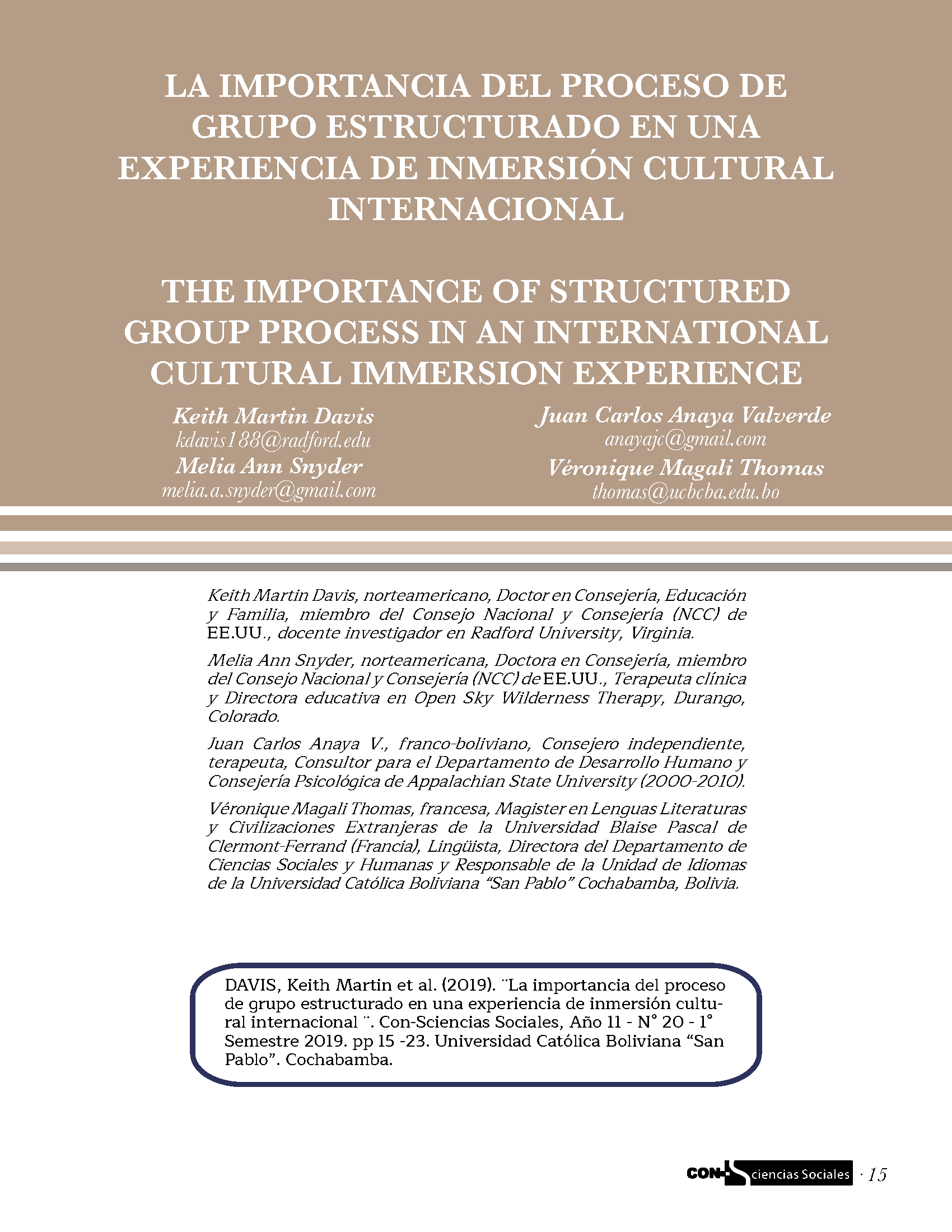The importance of structured group process in an international cultural immersion experience
DOI:
https://doi.org/10.35319/consciencias.20192028Keywords:
Process, structured Group, cultural Immersion, group cohesion, counseling, conflict managementAbstract
International cultural immersion experiences for counseling students offer unique opportunities to not only experience the wonders of another culture, but to share them with an intentionally formed group. The success of such an experience is often predicated on the development of group cohesion throughout the process. This manus- cript describes the formulation of a group for a short-term study abroad experience including the stages of group development and the importan- ce of a structured group process throughout the short-term study abroad experience. The authors discuss implications for counseling and counselor education.
Downloads
References
ALEXANDER, C. M., Kruczek, T., & Ponterotto, J. G. (2005). Building multicultural competencies in school counselor trainees: An international immersion experience. Counselor Education and Supervision, 44(4), 255-266. DOI: https://doi.org/10.1002/j.1556-6978.2005.tb01754.x
ARTHUR, N. & Achenbach, K. (2002). Experiential learning: Bridging theory to practice in multicultural counselling. Guidance & Counseling, 17(2), 39. DOI: https://doi.org/10.1002/j.1556-6978.2002.tb01299.x
BAGGERLY, J. (2006). Service learning with children affected by poverty: Facilitating multicultural competence in counseling education students. Journal of Multicultural Counseling & Development, 34(4), 244-255. DOI: https://doi.org/10.1002/j.2161-1912.2006.tb00043.x
CANFIELD, B. S., LOW, L., & HOVESTADT, A. (2009). Cultural immersion as a learning method for expanding intercultural competencies. The Family Journal, 17, 318-322. DOI: https://doi.org/10.1177/1066480709347359
COREY, M. S., COREY, G., & COREY, C. (2010). Groups: process and practice (8th ed.). Belmont, CA: Brooks/Cole.
DERICCO, J. N., & SCIARRA, D. T. (2005). The immersion experience in multicultural counselor training: Confronting covert racism. Journal of Multicultural Counseling & Development, 33(1), 2-16. DOI: https://doi.org/10.1002/j.2161-1912.2005.tb00001.x
GAZDA, G. M. (1989). Group counseling: A developmental approach (4th ed.). Boston: Allyn & Bacon.
GERSTEIN, L. H., & Ægisdóttir, S. (2007). Training international social change agents: Transcending a U.S. counseling paradigm. Counselor Education and Supervision, 47(2), 123-139. DOI: https://doi.org/10.1002/j.1556-6978.2007.tb00043.x
GLADDING, S. T. (2008). Groups: A counseling specialty (5th ed.). Upper Saddle River, NJ: Pearson Prentice Hall.
ISHII, H., GILBRIDE, D. D., & STENSRUD, R. (2009). Students’ internal reactions to a one-week cultural immersion trip: A qualitative analysis of student journals. Journal of Multicultural Counseling & Development, 37(1), 15-27. DOI: https://doi.org/10.1002/j.2161-1912.2009.tb00088.x
THOMAS, R. V., & PENDER, D. A. (2008). Association for Specialists in Group Work: Best Practice Guidelines 2007 Revision. The Journal for Specialists in Group Work, 33(2), 111-117. DOI: https://doi.org/10.1080/01933920801971184
TOMLINSON-Clarke, S. M., & CLARKE, D. (2010). Culturally focused community-centered service learning: An international cultural immersion experience. Journal of Multicultural Counseling and Development, 38(3), 166-175. DOI: https://doi.org/10.1002/j.2161-1912.2010.tb00124.x
TROTZER, J. P. (2007). The counselor and the group: Integrating theory, training, and practice (4th ed.). Philadelphia: Brunner-Routledge.
YALOM, I. D. (2005). The theory and practice of group psychotherapy (4th ed.). New York: Basic Books.

Downloads
Published
How to Cite
Issue
Section
License
Copyright (c) 2019 Revista Con-Sciencias Sociales

This work is licensed under a Creative Commons Attribution-NonCommercial 4.0 International License.









